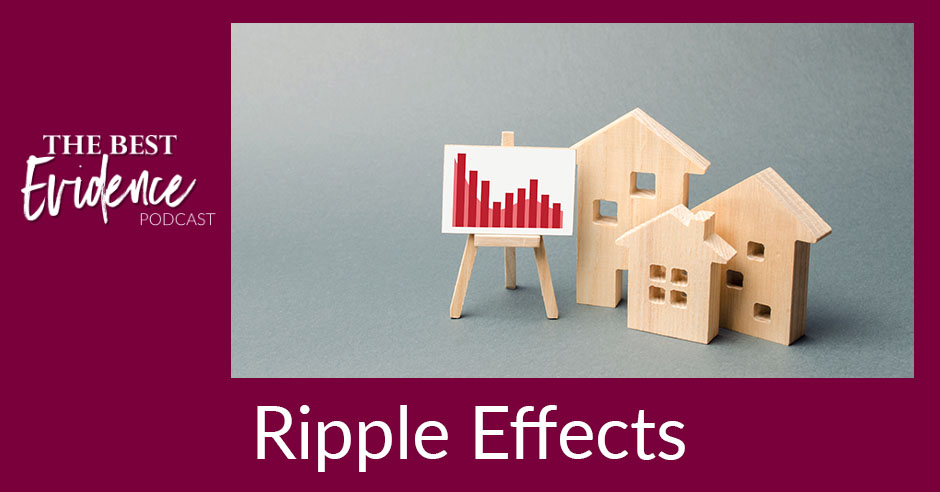
There’s a looming housing affordability crisis here in Canada, affecting more than just home ownership. The escalating housing price has had a ripple effect on renters that feels more like a tsunami, and people are finding it harder to acquire homes even with a middle-class income. How much more is it affecting the lower-income population? How about the younger generation only entering the housing market? In this episode, we explore how the crisis affects individual Canadians and its broader impact on society with an esteemed panel of guests: Alix McLean, Penny Gurstein, Queenie Choo, Paul Kershaw, and Catherine Leviten-Reid. Join hosts Cynthia Belaskie and Robbie Brydon to hear thoughts and opinions from various thought leaders and experts in the space as they gather insight on the current state of housing in Canada.
—
Listen to the podcast here
Ripple Effects
What Goes Down When Housing Prices Go Up
CB: Hi, Robbie.
RB: Cynthia, what are we talking about today?
CB: This is super exciting. We’re launching a series on Canada’s Housing Affordability crisis.
RB: When we launched this show, the pandemic induced acceleration, and housing prices was just getting started, but this isn’t just a pandemic problem.
CB: Over the past years, home prices in Canada’s major cities have increased by 300%. In Hamilton, that’s where I live, they’ve increased by 430%. That’s using Canada Home Price Index, which compares a property to itself when it’s sold in the future.
RB: We haven’t kept pace with that. In that same period from May 2002 to May 2022, average earnings only went up by 76%.
CB: Robbie, I love your numbers, but can we talk about this in human terms please? I’d like you to meet my friend, Alix.
I just find it absolutely bizarre that we are a normal middle-class family, making a good income and we can't afford all the stuff that my parents did with high school education. (Alix McLean) Share on XAM: I’m Alix McLean. I’m a researcher and writer in Hamilton. I work for YWCA Hamilton. I am a former neighbour of Cynthia. The story of how I’m not her neighbour anymore is the story of Housing Affordability in Hamilton.
CB: A few years ago, Alix and her husband rented a home in our neighbourhood. With a new baby, they needed more space, so they chose a fixer-upper house with a nice yard that was really affordable. They settled into the neighbourhood, made friends, enrolled their child in childcare nearby, and generally just made a home for themselves here. They were on the traditional path to home ownership that young people have been taking for generations. You rent housing and save some money for a down payment to purchase a house. In a few years, you can purchase the home of your own.
RB: The housing crisis has hit young families with a double whammy. Rents are so high that they can’t afford to save money for that down payment, and that down payment has to be higher and higher because the cost of homes is rising exponentially.
CB: It’s like running through mud towards the finish line that keeps moving further and further away. Home ownership remains out of reach, leaving in a precarious position and on a slide towards increasingly poor housing.
AM: We constantly lived in fear that it would get sold and we would have to move. In the midst of the pandemic, the owners called us and told us they were going to sell the house. We had to find a new house on one of the worst waves of the pandemic. We could not live in our neighbourhood anymore because it was completely unaffordable.
CB: Their rent went from about $1,450 for a house with a nice large yard and a desirable neighbourhood, to $2,000 for a three-bedroom apartment.
AM: It was across the city and a totally different neighbourhood, totally different school district. It’s barely affordable right now. We’re pretty privileged to make a decent amount of money, but I don’t know how people who make less than us pay more than $2,000 in rent.

Housing Affordability: In the midst of the pandemic, our landlords called us and told us they were selling the house. So we had to find a new house in one of the worst waves of the pandemic, and we could not live in our neighbourhood anymore because it was completely unaffordable. (Alix McLean)
CB: Like many Canadian families, Alix and her husband find themselves in a problem with no apparent solution. No matter which way they turn, there’s considerable financial risk and upheaval.
AM: Now, I look at real estate listings. If we got rent evicted from here, like we did the last house, we would not be able to afford a house of this size at all. We’d probably have to get a two-bedroom apartment.
RB: Anyone thinking about buying a house now has to be worried about the prospect of house prices falling at a recession. It’s a little bit like Russian roulette.
AM: I’m not totally invested in buying, especially in this market because it seems like something has got to happen. There’s a bubble. It might burst.
CB: What do you do?
AM: I’m from the East Coast. Property values make me nuts. I can’t imagine paying $800,000 or $900,000 for a house that is not exactly the way you want it. We would be buying a townhouse in Hamilton for $800,000, which we cannot do. It would be a compromise, which is bonkers. That’s insane.
CB: A lot of people have migrated to Atlantic Canada where housing has traditionally been much cheaper than Central Ontario.
It's making people angry. It's making people feel like that they're disenfranchised from society. (Penny Gurstein) Share on XAM: Where I come from, with real estate going up in PEI, I could get a mansion in PEI for under $800,000, which may be what happens. I don’t know, if I move home, I’m not spending $800,000 on a house. That’s for sure. Half of that could get us a decent single-family home in PEI. It’s tough. It’s just like, “What do we do? Do we move east to buy a house? Do we move further out in Ontario to buy a house?” I don’t know. I’m almost 40 and I still don’t know what I want to do. I find it absolutely bizarre that we are a normal middle-class family making a good income, and we can’t afford all the stuff that my parents did with high school education. I have a Master’s degree and my husband has a Post-grad degree in the tech industry, and yet here we are.
CB: I hate to say it, but Alix’s experience isn’t unusual. It’s a scenario playing out in cities and towns across Canada, with ripple effects up and down the economy and society.
RB: That’s exactly what Professor Penny Gurstein said when we talked to her.
PG: It’s a ripple effect. It started in large communities, but now as people are moving further and further away, small communities can’t deal with what’s happening right now either.
CB: Professor Penny Gurstein is the Project Director for the balanced supply of housing group of researchers centered at the University of British Columbia. She’s got something to say on this.
PG: Small communities in BC are just being inundated with people moving now. Where it was much cheaper, the cost between Vancouver and a place like Terrace was just so much different, but now they’re being inundated and they just don’t have the tools. They don’t have the capacity to address the fact that there’s a lack of housing there.
CB: That’s the same phenomenon Alix and I were talking about in relation to the East Coast.

Housing Affordability: It’s a ripple effect. It started in large communities, but now as people are moving further and further away, they’re finding small communities really can’t sort of deal with what’s happening right now either. (Penny Gurstein)
RB: The phrase ‘ripple effects’ came up again and again in our conversations. It’s not just in regards to the connection between larger and smaller communities. It’s also affecting individual’s relationship with society.
PK: Think about the ripple effects. In our biggest cities, you can have a 30-ish-year-old lawyer making a six-figure salary who’s now saying, “I can’t afford a home, so I’m going to go compete for those few rentals that are out there that have three bedrooms, so I can have two kids and I don’t have to raise the second kid in a closet.” That relatively-affluent-income young individual is then starting to compete for what we would have thought the middle earners of the spectrum were going to be going for in terms of rent.
CB: That’s Paul Kershaw, Associate Professor in the School of Population and Public Health at the University of British Columbia.
RB: He’s also the Founder of Generation Squeeze, a non-profit organization that advocates on behalf of young adults.
PK: The middle is pushed down to looking for what would have been more affordable housing, often going after the more affordable rental or co-ops, which then pushes the people we thought might rely on social housing, more and more into the extremes of being at risk for homelessness, and the people who are already homeless have nowhere to go.
CB: Alix’s story sits smack in the middle of this narrative too. It’s stoking resentment.
PG: It’s making people angry. It’s making young people angry. It’s making people feel disenfranchised from society.
We don't talk about wealth from housing enough. This is actually the key problem, why we can't solve unaffordability right now. (Paul Kershaw) Share on XCB: That connection to the rise of far-right populist movement is hard to prove, but we’ve seen it before in history.
RB: When we started recording this series, what we found was that virtually, everyone we talked to had stories of their own or stories of people close to them who were struggling with the cost of housing.
CB: Our producer, Brad Honywill, shared a story from a relative who shows that this isn’t just about young adults.
BH: I have a 70-year-old relative who was forced out of their rental apartment when the owner put it up for sale. They suddenly had two months to find an apartment in a rapidly escalating price environment while on a lower fixed income.
RB: What happened?
BH: They ended up in housing that was smaller, older, and costs 20% more. They were grateful to get it, but until that moment, they believed they were a hair away from homelessness.
CB: I think that’s definitely the definition of precariously housed.

Housing Affordability: The fact that we’re letting our entire housing system break down for even those who are more privileged is having these harmful ripple effects for those with less privilege. (Paul Kershaw)
RB: Queenie Choo is the CEO of SUCCESS, an organization serving newcomers in BC, including through affordable housing. She told the story of one family who had recently arrived at Vancouver.
QC: Luckily, they got support from their parents and family, so they were able to rent a place at about less than 500 square feet apartment, but they have two young daughters, aged 1 and 4.
RB: Luckily?
CB: I wouldn’t want to see what the unlucky people are in. I’ve got two kids I can’t imagine being in 500 square feet.
QC: Of course, they are low-income. One works in the bank. The other found a job working as a detailing mechanic in an auto shop.
RB: Queenie refers to these folks as low-income, but they work in a bank and an auto shop. These are supposed to be decent jobs. These are people who are “doing the right thing” and all they can rent is 500 square feet?
CB: That’s what a housing affordability crisis looks like.
We’re experiencing more visible homelessness here than you would have before. (Catherine Leviten-Reid) Share on XRB: That’s not the only symptom of a housing affordability crisis. Let’s go back to Paul Kershaw again. He said more about those ripple effects.
PK: The fact that we’re letting our entire housing system break down for even those who are more privileged is having these harmful ripple effects for those with less privileged. The worrisome vexing big problem is that I only just described half the situation for you. Because, why do we tolerate home prices rising and rising, so that even those young people with decent incomes can’t afford it now? It’s because the rest of us who got into the housing system much earlier, myself included now as a homeowner since 2004, we’re getting richer. Last year alone, you need to know this about my story, BC assessment told me in 2021, my home went up by more than $500,000.
RB: It’s not quite the same dollar value for us here in Hamilton and Burlington since we’re starting from a lower assessment based, but the price increases have been ridiculous.
CB: What about the folks who are counting on the equity in their home to support them in retirement?
PP: I’m a hard-working Prof. I’ve been a Prof coincidentally for seventeen years. I have a defined-contribution pension which allows me to track how much it grows over time. Over seventeen years, my pension is now worth $540,000. That’s pretty lucky compared to lots of people, but let’s be clear, seventeen years of full-time work as a hard-working Prof who works long hours contributes to my retirement savings equivalent to what I gained while sleeping in my home last year.
That can’t be what we have in mind as we are going forward in terms of people planning for their savings later in their lives, and we don’t talk about wealth from housing enough. Our national housing strategy doesn’t mention the word wealth once in it. This is actually the key problem why we can’t solve unaffordability right now.
CB: It’s important to note here that the impact on the individuals affected isn’t just financial. Catherine Leviten-Reid, Head of People, Places, Policies and Prospects Research Team based at Cape Breton University in Nova Scotia, sees this a lot in her work. Her research focuses on lower-income, renter households in Canada’s north.

Housing Affordability: Housing, and the lack of safe, affordable and good-quality housing, really impacts mental health. (Catherine Leviten-Reid)
CLR: It’s having a major impact on their lives. One thing that comes up continuously over my ten years doing research in this community is that housing, and the lack of safe, affordable and good-quality housing, really impacts mental health. People tell me about how worried they are about losing their housing. Mental health is one impact. Unquestionably, it’s affecting people’s economic security. Even though rents are lower in this community than many places, income assistance rates are very low, so people have problems paying their rent and are relying on the charitable sector to get by every month. This includes emergency food, donations of furniture and clothing as well.
CB: I want to say that nobody grows up thinking or wishing, “I want to go to a food bank someday, or I hope I can get some great donated clothes.” That’s not a Canadian dream. It’s an impact on sense of self, for sure.
RB: It’s that combination of income and housing that we’ve been talking about all along here that if housing gets more expensive and incomes don’t rise to meet it, then more and more people have that experience.
CLR: That’s certainly something we’ve seen since the start of the pandemic when people realized they could work from home anywhere. There was this interest and greater demand for housing in Nova Scotia and in particular, in smaller communities, not Halifax but places like Cape Breton, places like Guysborough County, which is on the other side of the Causeway that is experiencing a housing crisis because there are no properties available. There’s nowhere for people to live.
I would say that we’re seeing more visible homelessness here than we have before. If you are walking in Downtown Sydney, you will see people who have been sleeping outside, and that is new to this region. Then you also see more panhandling here than before. I think that there’s been strain on the non-profit charitable sector. Aside from the severe economic hardship and the strain on mental health, I think what’s going on as well is that we have people who are living in housing in need of significant repair. I think that’s really stressful.
CB: I’m always a big fan of looking at both sides of the argument, Robbie, but I find it’s a bit of a cop-out when we say, “But they both matter.” Come on, give it to me. Why do they both matter? We can’t just say the both sides make a good point.
JC: I think one of the biggest factors that distinguishes housing in the North from the rest of Canada is the absence of a housing market in most Northern communities. A greater role and the need for a greater role from the public sector, government, and subsidizing housing, making housing available, being a housing provider.
The pandemic has given us a real reminder that the housing crisis persists. It gets worse from year to year. It is a major public health concern simply because we might be moving into some kind of a post-pandemic world. It doesn’t remove us from the fact that there are significant health issues like overcrowding, experiences living on the street or living in shelters. There’s such a need for greater investment in housing and learning from some of the approaches that have been taken, and some Northern jurisdictions understanding what the lessons are that can be learned there. We’re doing some research on this at home in the north, but there was an increased flexibility in funding collaborations between different government agencies.
Important Links
About Alix McLean
 Experienced Senior Mechanical Engineer with a demonstrated history of working in the construction industry. Strong engineering professional skilled in HVAC and Energy Efficiency.
Experienced Senior Mechanical Engineer with a demonstrated history of working in the construction industry. Strong engineering professional skilled in HVAC and Energy Efficiency.
About Penelope Gurstein
 Dr. Penelope Gurstein is a Professor and Director of the School of Community and Regional Planning (SCARP) and the Centre for Human Settlements at UBC. She specializes in the socio-cultural aspects of community planning with particular emphasis on strategies and interventions that encourage diversity, equity and urban sustainability.
Dr. Penelope Gurstein is a Professor and Director of the School of Community and Regional Planning (SCARP) and the Centre for Human Settlements at UBC. She specializes in the socio-cultural aspects of community planning with particular emphasis on strategies and interventions that encourage diversity, equity and urban sustainability.
She is currently Principal Investigator of the Future of Public Housing Project (www.futureofpublichousing.ca), focusing on publicly assisted housing, and Co-Principal Investigator of Housing Justice (housingjustice.ca), a Peter Wall Solutions Initiative project, focusing on housing access and affordability.
Penelope has also worked on capacity-building projects in developing countries focusing on gender and youth development issues, most notably in Brazil, and has considerable experience working with community groups in the greater Vancouver region. Penelope is a member of the Canadian Institute of Planners.
Recent books include: Learning Civil Societies: Shifting Contexts for Democratic Planning and Governance (with L. Angeles, 2007, U. of Toronto Press); and Wired to the World, Chained to the Home: Telework in Daily Life (2001, UBC Press).
About Queenie Choo
 As the CEO, Queenie provides strong leadership to the 3 major lines of business including immigrant services, seniors care and affordable housing at S.U.C.C.E.S.S. She also is an active volunteer in serving many community boards. As a strong advocate on Diversity and inclusion, Queenie co-chairs the Joint Task Force Pacific of RCN to advance the work on diversity and inclusion.
As the CEO, Queenie provides strong leadership to the 3 major lines of business including immigrant services, seniors care and affordable housing at S.U.C.C.E.S.S. She also is an active volunteer in serving many community boards. As a strong advocate on Diversity and inclusion, Queenie co-chairs the Joint Task Force Pacific of RCN to advance the work on diversity and inclusion.
Recently Queenie is appointed to serve on the BC Premier’s Economic Recovery Task Force. Queenie also serves on the MetroVancouver Board, and chairs the OMNI-TV regional board in Vancouver and Vancouver Foundation. In 2021, Queenie is recognized by Business in Vancouver as the most 500 influential leaders in the non-profit sector.
About Dr. Paul Kershaw
 Dr. Paul Kershaw is a tenured professor at the University of BC, public speaker, regular media contributor and Founder of Generation Squeeze – a voice for younger Canadians in politics and the market, backed by cutting-edge research. Kershaw is one of Canada’s leading thinkers about generational equity.
Dr. Paul Kershaw is a tenured professor at the University of BC, public speaker, regular media contributor and Founder of Generation Squeeze – a voice for younger Canadians in politics and the market, backed by cutting-edge research. Kershaw is one of Canada’s leading thinkers about generational equity.
He received the award for Academic of the Year in 2016 from the Confederation of University Faculty Associations of BC. Twice the Canadian Political Science Association has honoured Kershaw with national prizes for his gender and politics research. He and his Gen Squeeze colleagues received the award for BC’s Affordable Housing Champion in 2017 from the provincial Housing Central coalition, while the Government of Canada awarded Kershaw its national prize for excellence in moving “Knowledge to Action” on housing in 2018.
Kershaw’s work has contributed directly to historic investments in BC child care, the first ever tax on empty homes in North America, eliminating limitless rent increases in Ontario, changes to municipal zoning, approval of dozens of new housing developments, and a shift in BC to reduce income taxes by taxing unhealthy home prices more. Kershaw is a policy professor in the UBC School of Population and Public Health, and Director of the Masters of Public Health program.
About Catherine Leviten-Reid
 Dr. Catherine Leviten-Reid is an Associate Professor in the MBA in Community Economic Development program. Dr. Leviten-Reid does research on housing, community development, the social economy, and social care.
Dr. Catherine Leviten-Reid is an Associate Professor in the MBA in Community Economic Development program. Dr. Leviten-Reid does research on housing, community development, the social economy, and social care.
Her work has been published in journals including the Nonprofit and Voluntary Sector Quarterly, Community Development, and VOLUNTAS: International Journal of Voluntary and Nonprofit Organizations. She is currently leading two research projects on affordable housing, one in partnership with Cape Breton Community Housing Association and the second with organizations and universities across the country.
Dr. Leviten-Reid obtained a Ph.D. (University of Wisconsin-Madison) and was a postdoctoral fellow at the Centre for the Study of Co-operatives at the University of Saskatchewan. She teaches courses in business and community development and research methods. In 2018, Dr. Leviten-Reid was awarded the Gold Roof Award for Housing Research Excellence by the Canada Mortgage and Housing Corporation.